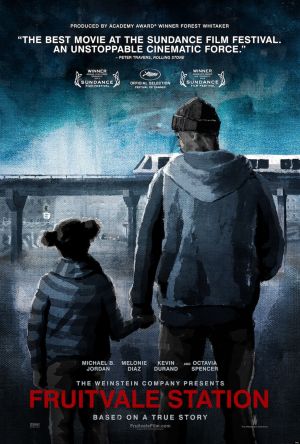
By Mallory Hellman
Fruitvale Station is provocative, but perhaps not in the way you expect.
In 15th- and 16th-century Europe, touring ‘morality plays’ warned the spectating public of the potential for damnation lurking under the surface of their every decision—eating supper, choosing a spouse, arguing with one’s neighbors. Wildly popular and often comedic, these productions preached unabashedly to their audience. They gave answers.
Fruitvale Station is not a morality play.
Instead, the film leaves us with a wealth of sometimes-uncomfortable questions. What gives rise to a national culture of violence? How is such a culture upheld? When a man is shot and killed by a law enforcement officer after a brief tussle on the train, what happens next?
How do we address what our justice system has become? How do we change it?
Fruitvale Station, a 2013 film by Ryan Coogler, dramatizes the final hours in the life of Oscar Julius Grant III, who died after being shot by a police officer at the titular Oakland BART station early New Year’s Day, 2009. He was twenty-two years old.
Grant’s story attracted national attention after footage of the police assault (taken by fellow BART passengers using cell phones) reached major media outlets. The resulting public outcry was both heartening and brief—in the wake of Grant’s death, the chief of the BART police stepped down, all officers involved in Grant’s shooting were fired, and Americans of a spectrum of political affiliations invested themselves in the greater national discourse of how to cope.
It was a moment of galvanizing. But only a moment. Because such conversations are inherently difficult to sustain, racially charged police violence of lost traction as a topic of national interest until the recent shooting in Ferguson.
Fruitvale Station helps link the events in Ferguson to a greater dialogue, a patchwork of such instances that spans centuries and continents. It’s a film of incredible power. Cinematically beautiful, with long takes and a multitude of urgent-feeling tracking shots, the film both savors each of Grant’s last moments and betrays a leaden knowledge of what’s to come. Michael B. Jordan’s performance as Oscar Grant is outstanding, and Octavia Spencer shines as Grant’s mother. Over the course of a short ninety minutes, the two portray a relationship so fraught with pathos that it rivals the beauty and complexity of Grant’s rehabilitating bond with his girlfriend, Sophina (Melonie Diaz).
Indeed, the majority of Grant’s relationships were at one time wounded. Per the film, he’d been making an effort to heal them as part of a life reconstruction he’d authored to provide more stability for his family (at one climactic moment, Grant dumps a gallon bag of marijuana into the Pacific). Perhaps what’s most striking about this detail is that no one—not his former employer, not his girlfriend, not the cops—believe that he’ll be good for it. And in the end, the police treat him the way they do largely, if not entirely, because of his looks.
Despite the heaviness of its subject matter, the film remains fresh and engaging throughout. Its tension builds incrementally, leading to a final ten minutes that are without a doubt some of the best, most harrowing cinema I’ve seen in years. Even when one knows the outcome, it’s near impossible to stay dry-eyed.
This is an important movie, and not because it tells us how to think. Rather, it forces us into conversation—with ourselves, with our society, with the systems that preside to keep us safe. May the dialogue be ongoing.